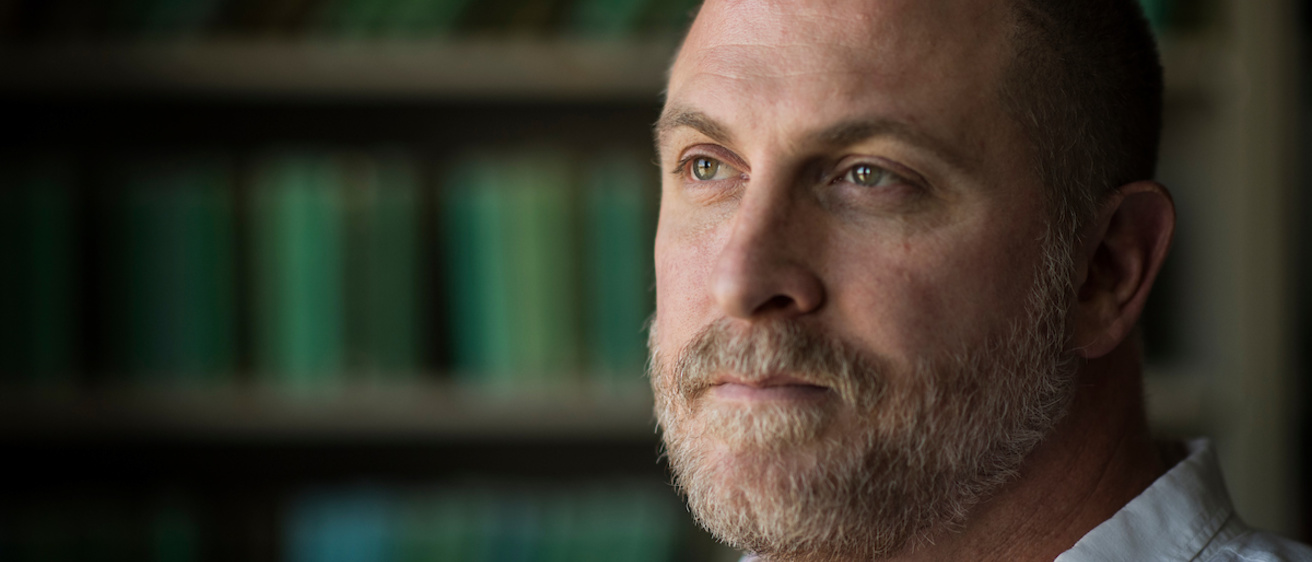Robert Cargill isn’t camera shy. The assistant professor of classics and religious studies at the University of Iowa is one of the primary scholars featured on CNN’s popular documentary series Finding Jesus.
Cargill also wrote the book The Cities That Built the Bible and has been featured on Discovery Channel and National Geographic Channel television programs. He has even appeared as the hopeful voice of reason on History Channel guilty pleasure Ancient Aliens.
For Cargill, his book and frequent TV appearances offer the invaluable opportunity to bring his scholarship directly to the public. It is also a way, he says, to remind people that humanities scholars are engaging in research and study that has tangible value to the world at large.
“We have a police force that keeps crime down,” Cargill says. “The returns on those tax investments are tangible. You can see them. It’s a little more difficult with the humanities.
“I think it’s all the more important that we in the humanities do what we can for public outreach, whether it be a blog or a television show or documentaries—or even just going out into the communities and speaking. It shows the public why they ought to be interested in what we’re doing.”
Cargill, who arrived at the UI in 2011 as part of the Public Humanities in a Digital World hiring cluster, sat down with Iowa Now to discuss the value of public scholarship.
Why is it so important to you to engage in public scholarship?
Having attended state universities all my life, I understand their value. People are working hard, trying to make ends meet, and their tax dollars are going off to fund research. We need to relay why what we’re studying is important.
I’m very thankful for the UI and for the people of Iowa who allow me to research all of this on their behalf. Then I can turn around and speak directly to them, not just to scholars, and show the public, “Here is what history teaches us about this; here is why that is important.”
What is an example within your scholarship of something that has practical application today?
When we go back and see how a dominant group—the Persians, the Greeks, the Romans—overplayed their hand and persecuted those who wouldn’t conform to them, that’s when the fall of their cultures began. As long as they were being inclusive and they were being fair, that was fine. As soon as they started to impose their values and what people had to conform to, that’s when they began to fall apart. I think there is a very modern application to that.
You’ve gained a lot of notoriety as a “debunker” of sensational archaeological claims. Why has that become such an important aspect of your public work?
I always had this aversion to when somebody stood up and said something that was demonstrably false but no one was disproving it. It can’t just be the loudest voice that people listen to. If nobody stands up to it and nobody questions it, everybody starts thinking it’s true.
There are people who don’t know the difference between scholarship and pseudo-scholarship or pseudoscience. If you don’t have those critical skills, there has to be somebody within scholarship that stands up and says, “No, that isn’t true and this is why.” It comes back to the public aspect of scholarship. It is important to debunk the nonsense because if you don’t, people will accept the nonsense.
You’ve also been heavily involved in the digital humanities, having built digital models of archaeological sites and so on. How has the UI supported that kind of work?
One of the brilliant ideas that the UI has had is not just to fund the digital humanities but to implement the Public Humanities in a Digital World. The idea is not just to fund people to do technological work in the humanities but to keep an eye on how to bring this to the public.
Going on CNN or the History Channel is all part of that. Not only does it help recruit students for my classes and the university, it’s also about trying to communicate to the public.
And because it’s about public digital humanities, we’re also looking to better understand social media. Scholars are just now not only figuring out how to use it but how it affects the way students learn.
What happens in the technological world has an impact on education; it affects humanities education. Funding the public digital humanities was brilliant foresight on the part of the UI because it brought people who otherwise have never been to Iowa here to study not just their own research but how this technology affects students’ learning. That is something where the UI leads the way.
How does the digital aspect of your work impact students in the classroom?
One of the things that I point out is when you touch history it becomes incredibly real. When students can touch history, whether it’s religious history or not, it becomes part of them. When they can touch the Western Wall, they touch a wall that was built by Herod the Great a couple thousand years ago. That’s a pretty big wall. That’s pretty cool. You touch the Eiffel Tower. You touch the remnants of the Berlin Wall. These things make history come alive.
For students who can’t afford to go there, I am happy to build a virtual reality world. We can do that now. You put on your goggles and all of the sudden you see the Roman Forum as it really used to look, instead of what you see now in ruins. You don’t have to use your imagination. You can see it.
